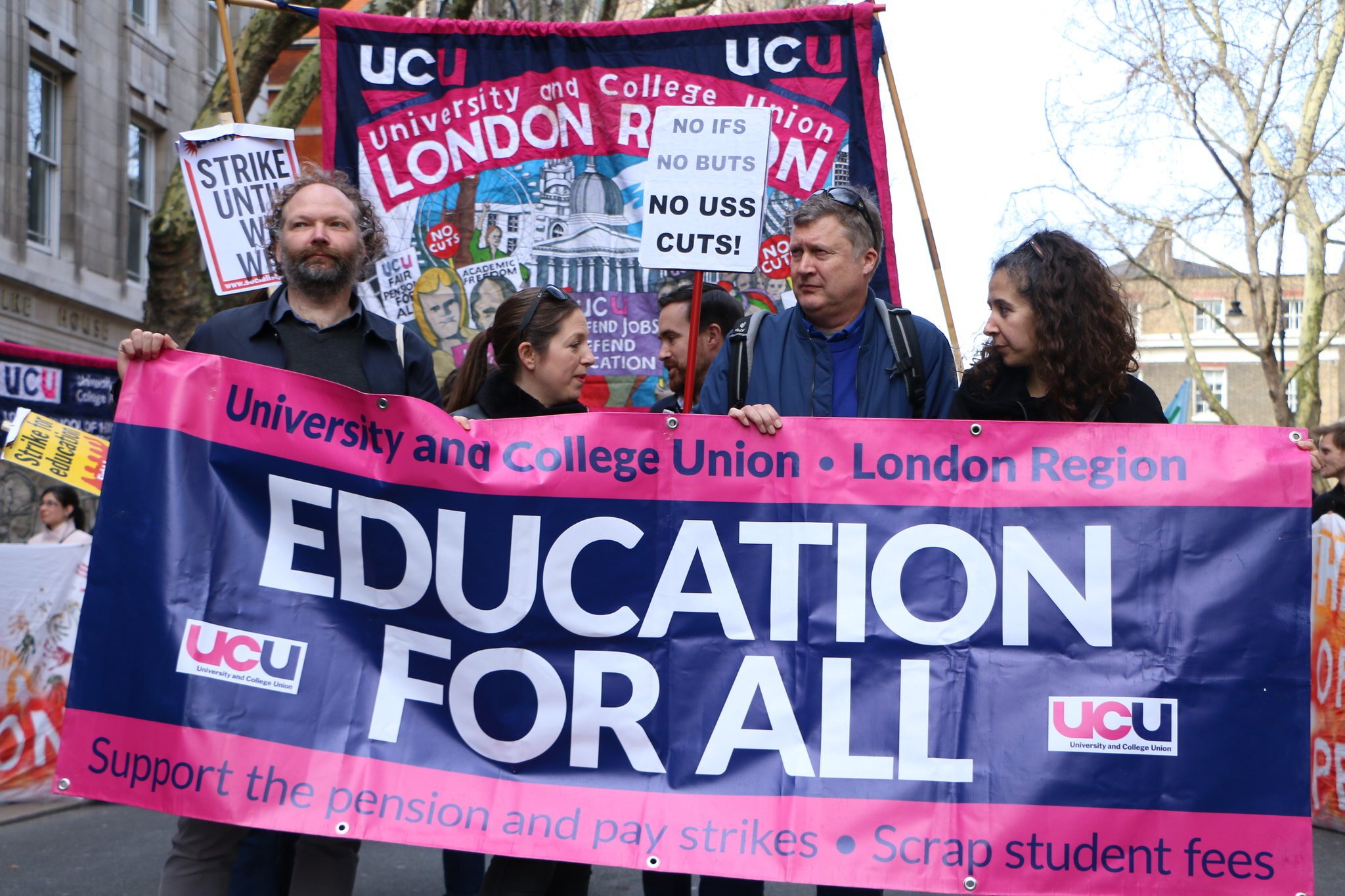Higher education (HE) is in a dire situation. So says Universities UK, the body that manages HE institutions across the country.
Chief executive Vivienne Stern has made it clear that “most of the sector is in trouble”, and that “we have gone way beyond cutting things no-one will notice”.
According to the Office for Students, the official HE regulator, about 40 percent of Britain’s 140-or-so universities will run a budget deficit in the forthcoming academic year. There are fears that a number are on the verge of going bust.
In response, at least 67 institutions are already engaged in ‘redundancy and restructuring’ programmes.
Many universities are looking to cut their workforce by as much as 10 percent. Coventry University, for example, is looking to cut £100m out of its budget in the next two years. Goldsmiths in London has also faced strikes and marking boycotts, after threatening to cut 130 staff from the humanities department.
View this post on Instagram
Impact on students and staff
This crisis does not come like a bolt from a clear blue sky. Storms have been gathering in HE for over a decade. Strike action amongst university staff has been seen every year since 2016.
The victims of this decay are students and staff. Lecturers are being given bigger and more frequent classes, with fewer resources available to them. Wages are stagnant, despite increased living costs. Campus buildings, in many places, are not properly maintained. And, in the most severe cases, workers are facing mass layoffs, as entire courses are axed.
All of this, and more, is chipping away at the university ‘experience’ for students. For most, the reality of campus life is harsh; far from the idealised image portrayed in promotional prospectuses, featuring students in close contact with lecturers, enjoying in-depth discussions on big ideas, and experiencing all that a new city has to offer.
Instead, professors and tutors have no time for individual follow up. Students are thrust into lecture theatres packed with hundreds of classmates. And they are forced to count the pennies in an effort to pay ripoff rents, while maintenance loans remain stagnant.
Increasingly, many students are being forced to live in locations far from their places of learning, as university bosses take on more students to plug their financial holes, without expanding the supply of campus accommodation to match.
Starmer’s status quo
 The blame for this grim situation lies firmly at the feet of capitalism, with its drive to privatise and marketise education.
The blame for this grim situation lies firmly at the feet of capitalism, with its drive to privatise and marketise education.
Universities are expected to run themselves like businesses. And the new Labour government has made it abundantly clear that they will continue down this road.
Education secretary Bridget Phillipson is sticking firmly to the message that universities must solve any financial problems for themselves. There will be no bailouts for HE institutions that go bankrupt, Starmer’s government has affirmed.
Similarly, despite pressure from the establishment and its mouthpieces, Phillipson and co. have also ruled out any increase in tuition fees (for now, at least), no doubt wary of provoking a massive backlash from students, as David Cameron faced in 2010.
All that Labour can suggest is that university bosses look at ‘restructuring’ and ‘refocusing’ – that is, cut, cut, and cut some more.
Where these cuts come from is up to university management, as far as those in Downing Street are concerned.
Crisis of capitalism
Mismanagement by university bosses has played a part in producing this sorry state of affairs. And certainly a healthy sum could be saved by chopping the sky–high salaries ‘earned’ by vice–chancellors. But this would not plug the gaping gap in the budget.
In fact, this crisis is the product of years of capitalist chaos and cuts.
All the while, universities have been increasingly opened up to private sector vultures. Many support staff are hired through private outsourcing companies. New university buildings are built by construction conglomerates. And shops, bars, and other campus services are run by private enterprises.
The sole aim of all these companies is to make as much profit as possible, leading to price gouging and cuts, alongside and a syphoning of student fees and rents into the hands of big business.
Inflationary pressures in the wider economy have added to this crisis. Increased energy costs have impacted universities, as have the rising costs of other essential resources: computers, software, science equipment, etc.
All of this has been compounded by the political charade and bombast around immigration. One fifth of university funds come from the extortionate fees charged to non-EU students. But the establishment’s hardening line on immigration has put this vital revenue stream at risk, with a reduction in international applications.
University bosses are therefore entangled in a Gordian Knot: unable to balance their books through student fees; sitting on a rising pile of debt, at a time of elevated interest rates; and fearful of sparking a blaze of staff and student struggle across UK campuses by attacking teaching and learning conditions.
Unite and fight!
Students coming to university this year will be going from the frying pan into the fire. The schools and colleges they have just graduated from are also facing a funding crisis.
All of this is creating a pressure cooker environment on Britain’s campuses, with the potential for an explosion at any point.

The last academic year saw a wave of student encampments sweep across the country, aimed against universities’ complicity in the genocide in Gaza.
In certain places, meanwhile, industrial action has temporarily averted cuts. Goldsmiths’ staff managed a partial victory recently, for example, thwarting the threat of compulsory redundancies and cutting job losses by 50 percent.
Starmer’s government has already made it clear that they will not make the lives of workers and young people any easier. Students and staff can therefore only rely on their own forces in the fight to defend education.
What is required is a mass campaign aimed at kicking capitalism and imperialism off our campuses.
Mass meetings should be called to involve the widest layer of students and staff. And grassroots committees should be elected, tasked with organising the fightback at a local level.
As a first step, they should demand that management open up the books, so everyone can see where the money is really going.
Any threat of cuts should be met with coordinated action by lecturers and support staff, with students called upon to offer support and solidarity, including a campus-wide walkout.
All of this must be linked to a clear socialist programme for higher education: demanding free education, funded through the expropriation of the billionaires and bankers; and raising the call for democratic control of universities by workers and students.
Senior management, Universities UK, and Starmer’s government have proven their inability to run our universities. Those working, studying, and living on campuses must therefore take matters into their own hands.
Only in this way can the deepening crisis facing higher education be brought to an end.
Cuts, competition, and chaos: The grim reality of student life
Student life is sold as living and learning in high-quality facilities, non-stop partying and socialising, and generally having the best time of your life.
More and more, however, students are exhausted from working part-time jobs to pay rent, for the privilege of living in mouldy, rundown accommodation, to learn in universities gutted by cuts and privatisation.
Here is what students and graduates have told The Communist about their time at university.
Do you have a freshers horror story? Are you a graduate feeling ripped-off? We want to hear from you! Head to communist.red/write to tell us about your experiences.
Cambridge students: Beware!
The University of Cambridge is one of the UK’s wealthiest academic institutions. As such, you might expect that it weathered the current crisis in higher education better than some of its competitors.
The state of its shoddy student accommodation, however, tells a different story.
During my first year at Sidney Sussex College, my accommodation had no access to cooking facilities beyond a kettle, a rice cooker, and a microwave.
Some sort of insect larvae were even found in the showers in the first term! The tap water was consistently cloudy, the hot water supply patchy, not to mention the lifts and outdated central heating system repeatedly being disabled or in a state of disrepair.
But it seems we had it pretty good compared to some of the other colleges. A recent Varsity article reports that an issue with the water systems at Trinity College caused a rise in chlorine levels that left five college members receiving medical treatment!
Another article, meanwhile, recounts how King’s College’s Spalding accommodation flooded in August, leading to the evacuation of the summer school students staying there.
You have to wonder how a university with so much money at its disposal has allowed the accommodation of its colleges to fall into such a state of disrepair!
It seems the university has forgotten it’s supposed to be a centre for education, not profiteering.
The university has no less than £6 billion at its disposal, which it generously invests in arms companies supplying the Israeli onslaught in Palestine. But apparently, it cannot afford to keep its student accommodation safe and habitable.
The position of management is clear: money for imperialism, not for education.
Ben, Cambridge
Starve, stress, and sell your body
As a student in my final year, when I look back on the atmosphere amongst my peers, the main emotion conjured in my mind is that of overwhelming anxiety. There is a crisis of financial stress that permeates the UK’s student population.
One of my friends, for example, had to work as a barista two to three days a week just to afford rent and groceries, forcing them to do their coursework well into the evening.
Two more were recently thrown into a panic when they received word from the state-run student loans company that they would only receive around two-thirds of their expected loan.
Neither of their families are able to support them. In one case the majority of their parent’s income goes to supporting their disabled brother, a situation that was completely unaccounted for in the loan calculations.
In the UK, 82 percent of students worry about making ends meet, and a staggering 64 percent feel the need to skip meals to save money.
The most barbarous reflection of this process is that over 56,000 students are turning to online sex work to pay the bills!
Across the country, grades, health, and sleep suffer due to financial stress. Meanwhile, private companies and university bosses make a killing.
Amy, Leeds
Mouldy wallpaper, anyone?
The rise in energy prices has led to landlords rushing to put the crisis on their tenants, setting fines for ‘unfair use’ of electricity or gas. And what constitutes ‘fair use’? This was left for us to guess.
My housemates and I were already paying out 1.5 times our maintenance loan on rent. Stressed that we may be charged extra on top of what we already couldn’t afford, we went until the cold months of November before turning the heating on.
In this time the damp in our house – an expected feature of most student properties – had gotten worse. Black mould we previously hadn’t noticed had spread considerably.
At one point, the wallpaper got so damp it began to peel off the bedroom wall. After telling my landlord, their response was to apologise and…glue the mouldy paper back on!
This was combined with a few slapdash attempts from them to remove the mould by coating our walls with bleach!
In the end, getting rid of the mould was done by the joint effort of me and my housemates.
We became nervous to contact anyone about the mould, as we were warned that if the mould was seen to be our fault, we would have to pay the costs for them to fix it.
We were then repeatedly blamed for creating the conditions because we were underusing the heating.
The mould had considerable effects on our health, and of course this then went on to severely impact some of our studies.
If universities really cared about the welfare and education of their students, they would do something about these parasitic private landlords. But unfortunately this would hurt their precious profits.
Leah, Lancaster
‘An Oxford man’

This summer, I have been working in housekeeping, cleaning facilities and accommodation at the University of Oxford.
The Oxford workload is incredibly demanding, with two essays due every week, unrecorded lectures, and exams at the start of every term.
In order to maintain an elite academic standard, undergraduates are advised against working during term time.
Simultaneously, however, our university-owned accommodation rents have increased to up to £922 per month.
This puts working-class students at great disadvantage. Some students are hardly surviving, unable to cover their living costs on their maintenance loans.
As a result, many students like myself work at the university in housekeeping for low wages during the holidays.
Most jobs are difficult to secure for Oxford students, due to the extremely short-term availability.
Exhausted after our shifts, we must put in a second shift of studying with minimal time for relaxation!
Many of the students with whom I work wish to pursue masters and PhDs after graduating, only to be whacked over the head with no funding and insanely competitive grant schemes, regardless of their elite academic achievements.
Students are pumped out of these elite institutions, utterly exhausted, laden with masses of debt, only to fight tooth and nail against other precarious students in an increasingly competitive job market.
Tara, Oxford
Gutting universities
This year I finished my bachelor’s degree in literature at University of Brighton, and I am truly grateful to my lecturers. Of course they taught me, but they also undertook industrial action for the good of my university.
As I was entering into my third and final year, the board saw fit to make half of the academic staff redundant in my department. It’s funny how my fees stayed the same though.
Among those the board thought best to make redundant was Kate Aughterson, the remarkable woman who founded my course and wrote many of the modules.
So put yourself in my shoes: going into last year, you’ve got half the lecturers doing double the work; half the expertise available when being allocated a dissertation supervisor; the woman that wrote loads of modules is gone; and this is at the end of a hard-fought campaign of industrial action disrupting my second year.
The abysmal way I saw University of Brighton treat its staff and students moved me to adopt the politics of solidarity and class struggle.
When workers take industrial action in universities, students must know to lay the blame of their disruption on the capitalist executive boards and vice chancellors. It is they who impose the conditions workers must strike against.
Lexi, Brighton
‘Mercedes only’
This evening I was researching the salary of Napier Vice Chancellor Andrea Nolan – which is over £225,000, by the way! – and found an article written by the Scotsman which exposed her other lavish spending on the university’s dime.

This included £4,000 in a single year spent on top of her salary on a chauffeur service. This service in particular only drives a fleet of Mercedes, because Lord forbid Her Majesty be spotted in anything less than a pristine Merc!
Another £1,700 was spent on a singular trip to Singapore, where Nolan was given the five-star treatment.
Earlier in the week, RCP comrades at Napier had been discussing the upwards of £700 spent each month on university-owned accommodation at places like Bainfield.
One student described their en-suite in Bainfield as being “disgusting, covered in mould, and stinking” upon arrival.
Another student described living in Bainfield as an “experience that made me realise that a university is a place of business and not academia”.
It’s time to run our universities like educational institutions, not businesses. That means doing away with the bosses like Andrea Nolan, and running the place ourselves!
Orla, Edinburgh
Please sir, can I have some work?
Just as new students are rolling up for freshers, recent reports make for grim reading on their prospects under capitalism.
Apparently “61 percent of 2022 graduates were in full time work within 21 months”.
And the Office of National Statistics found that 26 percent of graduates since 2015 were in ‘medium or low skilled’ jobs.
Let’s put those numbers another way: nearly two years after graduating and paying £27,000 on tuition fees, almost 40 percent of graduates still haven’t got full-time jobs, and many who have got work are in low-paid jobs.
Kevin, Falmouth






